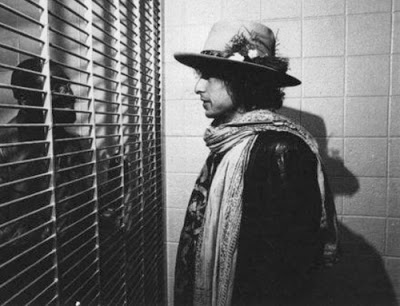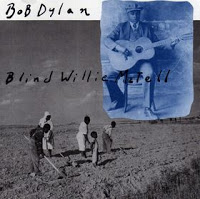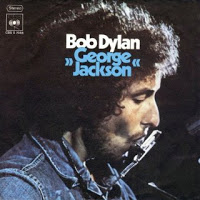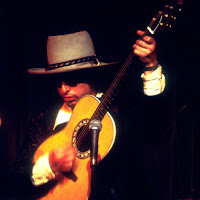 |
| Bob Dylan visits Rubin “Hurricane” Carter in prison, 1975. Image from Tumblr. |
Bob Dylan’s biography of American racism
“Sometimes I think this whole world / is one big prison yard / Some of us are prisoners / and some of us are guards.” — Bob Dylan, “George Jackson”
By Ron Jacobs | The Rag Blog | March 4, 2013
When people think of Bob Dylan, it’s unlikely very many consider him a biographer. Yet, he does write songs about people. I don’t mean that in a general sense, either. I mean he literally writes songs about people. Some of those songs are about people that only Dylan knows or at least only Dylan knows who they are about. Others are about people most of us have heard of or heard of because of a song Dylan wrote.
Recently, I was choosing some images from the web for a display concerning the Emancipation Proclamation and the 1963 March on Washington for Jobs and Justice. As I clicked my way in and out of websites I came across a grainy photo of Bob Dylan, Joan Baez, Harry Belafonte, and other musicians on the stage at the aforementioned march.
This got me to thinking about Bob Dylan and his songs concerning the racism that is part of the definition of these United States. Then I got to thinking about those Dylan songs that name people; even more specifically, the songs that named people that were famous in their own right. “Joey” came to mind. Upon examination, though, this song stands out as an anomaly in the Dylan catalog. Not only is Joey Gallo an ambiguous hero at best, Dylan’s lyrics do not really attempt to make a point, unlike the other songs in this rather loose set.
Then I narrowed the whole process down to songs that are tributes to individuals as opposed to songs which portray an incident featuring an individual who is either acting or being “acted upon.” A song in the former category would be the dark tale Dylan tells in “The Ballad of Hollis Brown.” This song is a tale of a farmer driven to the simultaneously horrendous and protective act of murdering his family because of economic ruin.
Songs that fall in the latter category include “The Death of Emmett Till” and “The Lonesome Death of Hattie Carroll.” Both tunes describe an incident of racist injustice that not only goes virtually unpunished but, in Dylan’s telling, is symptomatic of an evil at home in these United States. Indeed, it is not just at home, but is one of the darkest elements in the myths that describe the nation.
Emmett Till was more than just a boy who looked the “wrong” way at a white woman down South. He was a threat to white supremacy and its falsehood. Millions of men and women paid a price quite similar to Till’s in slavery, lynchings, and prisons. Hattie Carroll lost her life when a rich white man carelessly and callously killed her with his cane. Her killer’s punishment was inconsequential: six months for murder.
 |
| Recorded 1983 for Infidels; Released 1991 in Bootleg Series. |
Blind Willie McTell is perhaps most famous nowadays for his song “Statesboro Blues,” most likely titled after the city he grew up in. Although McTell was somewhat well-known on the blues circuit during the 1920s and 1930s, most folks who know this song today know it because of the Allman Brothers. Their version is electric and extended. McTell played a fluid twelve-string and the occasional slide. He lived for 60 years and played throughout the southern United States in a style of picking known as Piedmont — named after the region of the Carolinas it originated in.
While Bob Dylan was recording songs for the album eventually known as Infidels, he recorded his song “Blind Willie McTell.” A masterpiece of a song from a man who has many such songs to his name, Dylan’s work is about much more than the blues singer Willie McTell. It is an angry message transmitted through Dylan from an angry god. Even more, it is about a people and a nation that continue to suffer what Abraham Lincoln correctly identified as “the woe due to those by whom the offense came.”
Just as Mr. Lincoln told the nation in his Second Inaugural Address that perhaps “every drop of blood drawn with the lash shall be paid by another drawn with the sword,” so does Dylan close his song with a parallel observation and warning: “Well, God is in His heaven/And we all want what’s His/But power and greed and corruptible seed/Seem to be all that there is.”
The entire song is written in the minor with the piano the dominant instrument. One sees images of slave auctions, tenant shacks, Ishmael Reed’s Arthur Swille and Raven Quickskill, and Neil Young’s southern man; Christopher Dorner and Barney Fife; Richard Wright’s Bigger Thomas and the past and future Imperial Wizards of the Ku Klux Klan; Huey Newton, Oscar Grant, and Nina Simone. The cries of the whipped and the sound of the lashes become as real as the silence of solitary in today’s supermax prisons.
I remember hearing George Jackson had been killed a few hours after it occurred. The news reports coming in from the AP over Armed Forces Radio were sketchy and most notable for the information they did not provide. European broadcasts were somewhat more complete but all of the reports echoed the official line that Jackson had been trying to escape prior to his murder.
We still don’t know exactly what happened. The theory that makes the most sense to me is that he was planning to escape and had been working out the details with a section of the Bay Area Black Panthers, their mutual allies, and a probable police agent who tipped off the authorities and thereby ensured Jackson’s murder.
 |
| Two-sided single, 1971. |
It’s difficult to explain the power George Jackson’s words and life story had when his first book Soledad Brother was published. In a world hungry for men and women who had lived a life of wretchedness and risen from those roots, Jackson’s was a life that indicted the evils rooted in slavery and U.S. capitalism while providing hope that this world could be changed. His brother’s heroically futile attempt to free him from the prison George had been exiled to only enhanced his revolutionary and ultimately tragic mystique. So, too, did the arrest and imprisonment of Jackson’s lover and comrade, Angela Davis.
My thoughts upon hearing Bob Dylan’s tribute to Jackson, simply titled “George Jackson,” were that even Bob Dylan, the rock superstar and (by then) recluse was not immune to the meaning of Jackson’s life and death. A poet, after all, lives to discover a meaning in the world that he exists in. For a poet like Dylan, the story of George Jackson confirmed his growing understanding that the scourge of racism was the defining condition of the country he lived in. Indeed, as he explained in a 2012 Rolling Stone interview:
This country is just too fucked up about color. It’s a distraction. People at each other’s throats just because they are of a different color. It’s the height of insanity, and it will hold any nation back — or any neighborhood back. Or any anything back. Blacks know that some whites didn’t want to give up slavery — that if they had their way, they would still be under the yoke, and they can’t pretend they don’t know that. If you got a slave master or Klan in your blood, blacks can sense that.
In other words, as far as Dylan is concerned, there is very little hope. Perhaps the most memorable lines in “George Jackson” are contained in this quatrain, “Sometimes I think this whole world/is one big prison yard/Some of us are prisoners /and some of us are guards.” These lines describe the nation’s dilemma better than any treatise might. Until the guards are willing to accept the fact they are as imprisoned by the legacy of racism as the prisoners they guard, beat, and kill, none of us will be free to leave the prison that is these United States.
Those that try, especially African-Americans, all too often find themselves put away behind bars even more real than the figurative ones that we know as racism. That is the story of Rubin “Hurricane” Carter, a black man who fought his way out of the prison of poverty and the urban ghetto only to be charged with a crime “that he never done.”
 |
| Rolling Thunder Revue, 1976. |
Like Jackson, Hurricane Carter spent a good portion of his life in prison. Also, like Jackson (and millions of others), Carter’s fate was determined by men and a system that cared little for the truth. Dylan’s lyrics tell the story of dirty cops, lying witnesses, and a prosecution determined to put Carter in prison, if not for the crime he was charged with, then because he had too much pride in his person and his race; traits not just hated by the white power structure, but seen as serious threats. Carter, like Jackson, came to understand his position, a fact which led to his undoing almost as much as the perversions of justice existent in the cases of both men.
When Bob Dylan released his song “Hurricane,” most people had not heard of Carter or his case. As I recall, the demand for a new trial was primarily popular among left organizations like the Revolutionary Union, its student group the Attica Brigades/Revolutionary Student Brigades and various radical anti-racist organizations on the East Coast of the United States.
When Dylan recorded his song and released it as a two-sided single (because of its length), many radio stations did not know what to do with it. The more cutting-edge stations that played non-formula album cuts and regional artists (WHFS-FM in Maryland, WNEW-FM in New York, for example) played the song in its entirety, flipping the single mid-song or having it cued on two turntables. Other, more commercial stations didn’t play it much at all until it reached the Top 40. Stations that traditionally catered to Black audiences were also slow to play the song at first, with the exception of a few college and community-owned stations.
Meanwhile, Dylan and his cohorts were organizing what would be known as the Rolling Thunder Tour. This tour would champion Hurricane’s case and was perhaps one of the last great “Sixties” tours (with the possible exception of the continuing road trip of the Grateful Dead.) Hurricane did get a new trial. He was convicted again, thanks to continued prosecutorial misconduct. He was finally freed in 1985 after a federal judge determined that Carter’s arrest and prosecution was “predicated upon an appeal to racism rather than reason…”
To put it simply, the song itself rocks. There is no other word that describes its appeal. There is probably no other rock song that features a gypsy violin as lead instrument where that can be said. Sharing imagery with the New Jersey street songs of Bruce Springsteen and borrowing rhythms and melody from Ashkenazi and Romano folk songs, “Hurricane” maintains a level of emotion appropriate to its subject matter.
After all, we were trying to save a man’s life. It was already too late for Blind Willie McTell and George Jackson.
This article was first published in Red Wedge Magazine.
[Rag Blog contributor Ron Jacobs is the author of The Way The Wind Blew: A History of the Weather Underground. He recently released a collection of essays and musings titled Tripping Through the American Night. His novels, The Co-Conspirator’s Tale, and Short Order Frame Up will be republished by Fomite in April 2013 along with the third novel in the series All the Sinners Saints. Ron Jacobs can be reached at ronj1955@gmail.com. Find more articles by Ron Jacobs on The Rag Blog.]

















